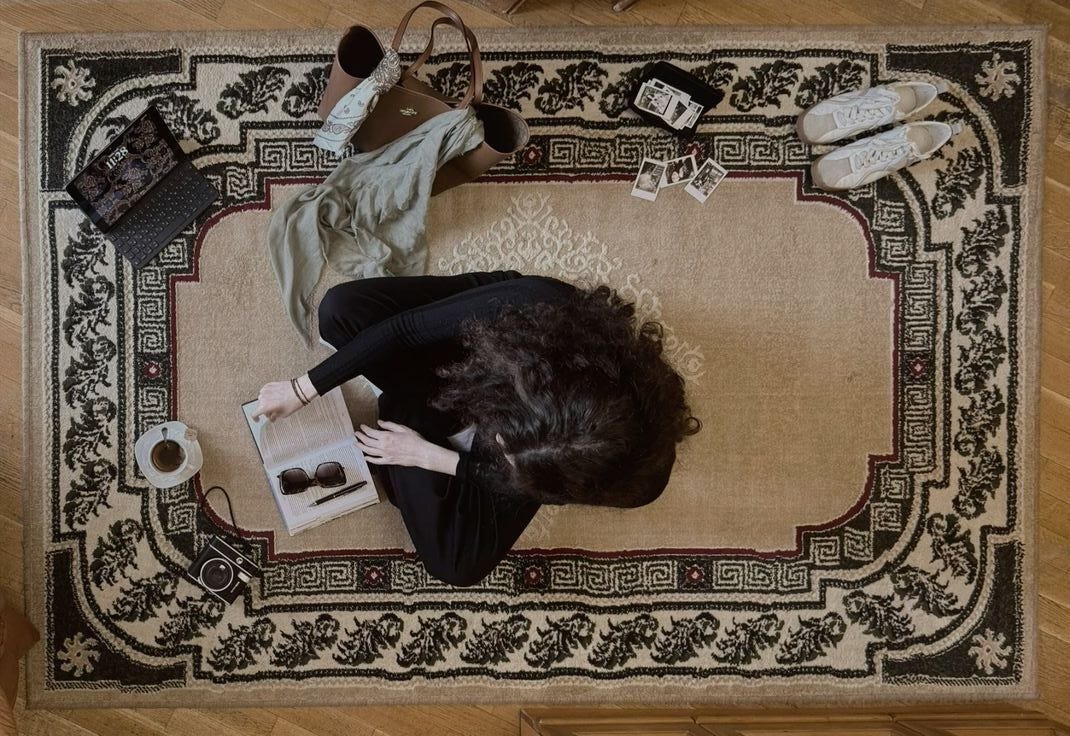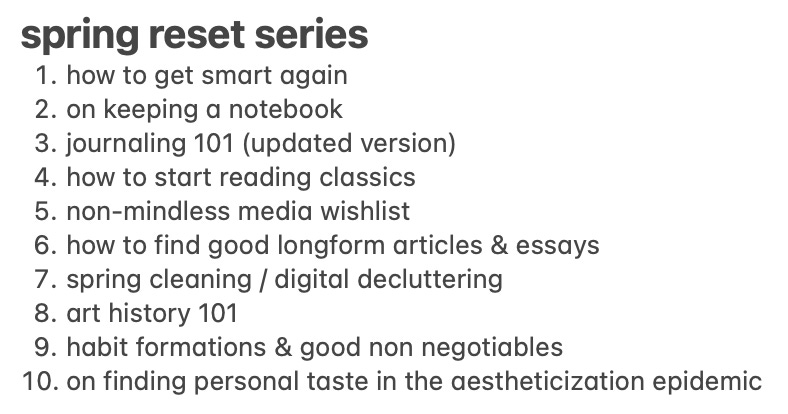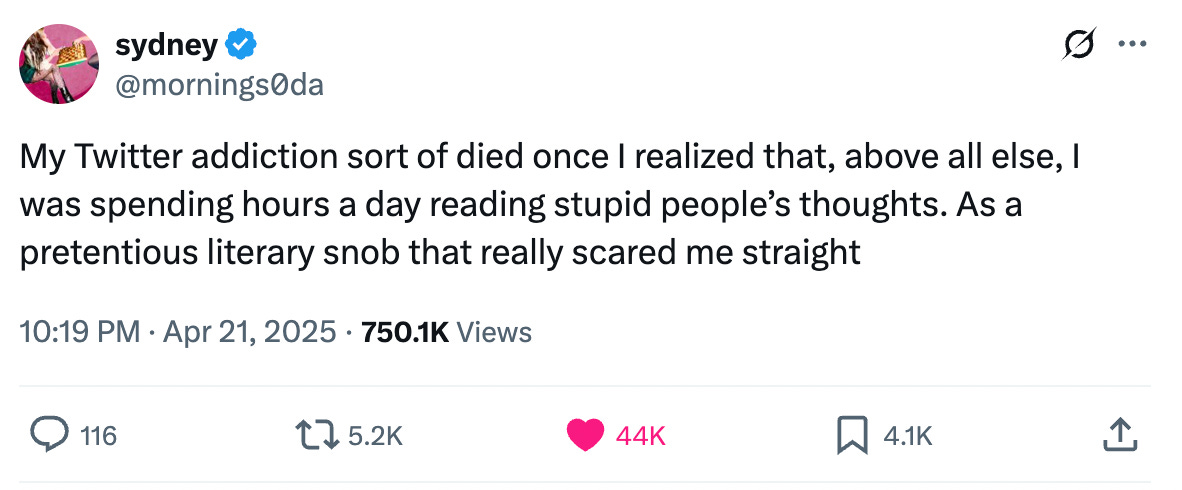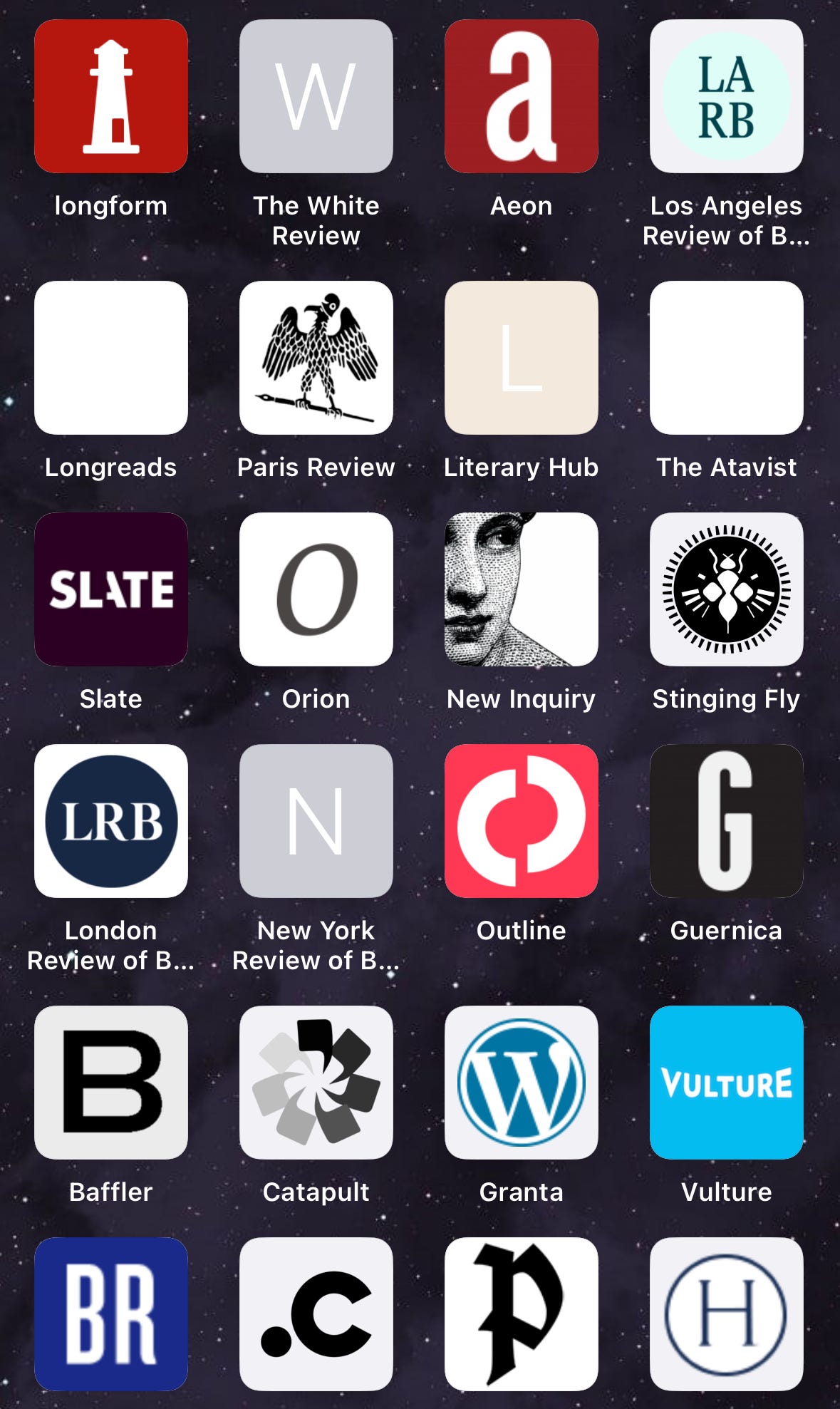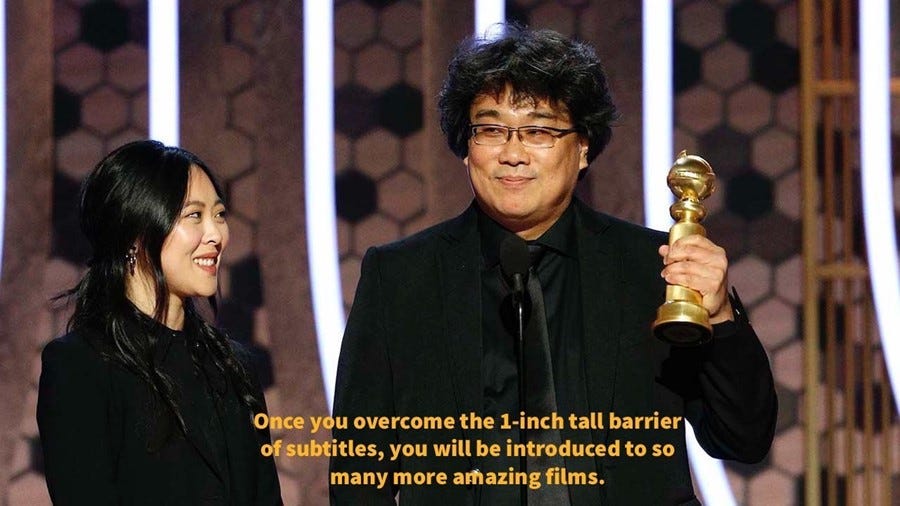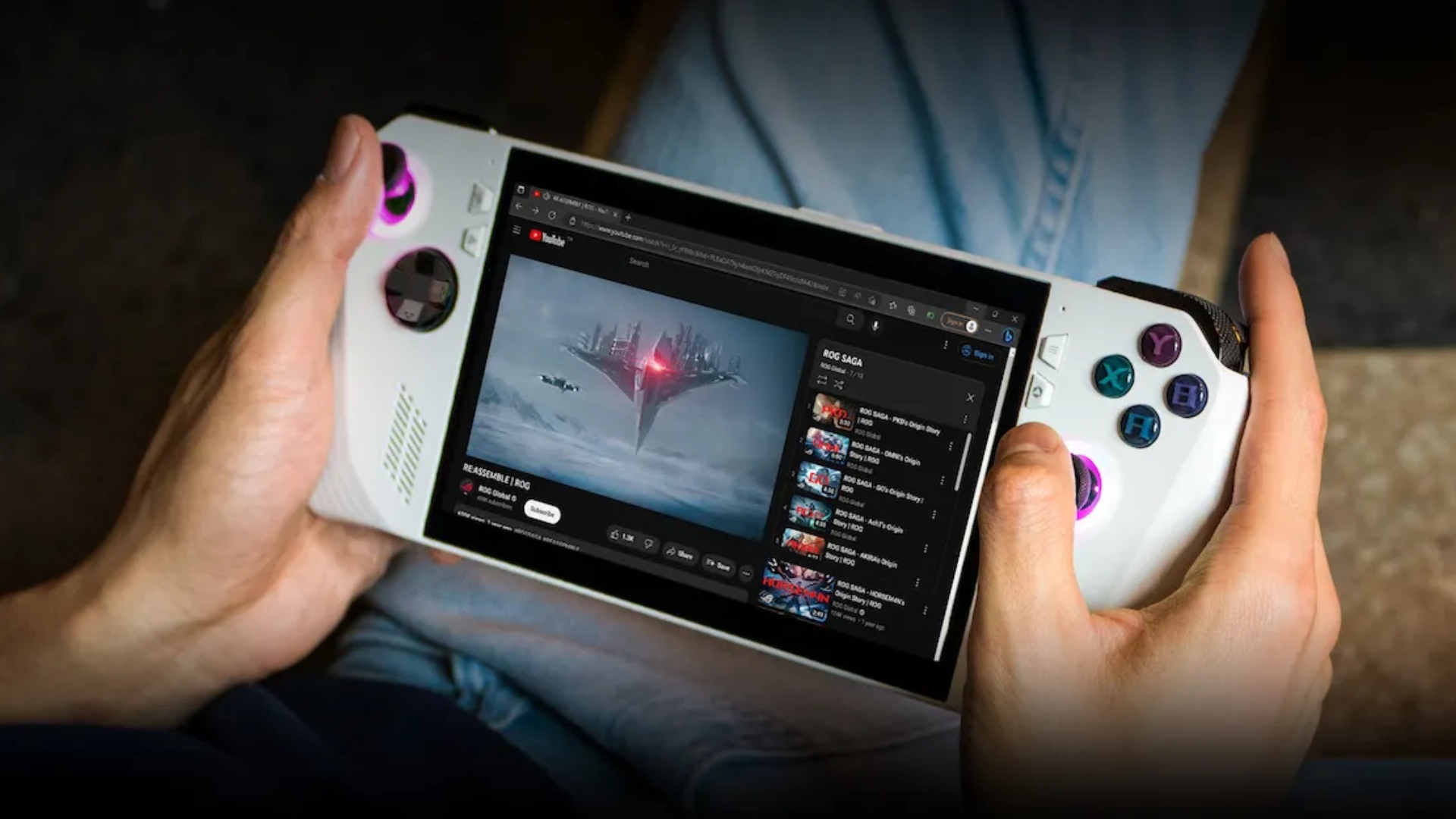[part i of my how to get my life back together series — if you like this, consider upgrading your subscription because the other parts will be for paid subscribers! this post may also be paywalled in a bit.]
In all honesty, my biggest concern and secret in the last two years that I’ve been out of school is that my brain has slowly been melting away. And by slowly melting away, I mean that I can physically feel my mind’s growing reluctance to concentrate, to truly think, and my attention span slipping out of reach. I sit at my job and create documents and spreadsheets that seem completely meaningless for eight hours a day. I get home and make myself dinner, stirring with one hand and scrolling on Twitter with the other. I turn on a rerun of a show that I can almost recite line by line (I am a chronic rewatcher). I’m currently reading a book together with my friend, and when he said “remember this part?” I did not.
In other words, I feel like my life has become mindless and thus a bit meaningless.
One of the biggest and most significant things I had to grapple with post-grad was the notion of not being a student anymore, that academic learning was not a required daily task in my life anymore. During the first few months after graduation, I felt like I was physically shouldering the burden of learning, on my own shoulders for the first time in my life. All my life, I had been accumulating knowledge and learning something every day in school, without even thinking about it. But out of school and at a job, where one day always seems to bleed into the next, the responsibility to remain intellectually curious fell on me. And I haven’t been that good at it.
Something I’ve decided to do this spring and summer is to fix my brain. And by this, I just mean fixing my attention span and trying to get rid of the habit of mindless multitasking or choosing media that doesn’t require thinking. Don’t get me wrong, I’m not saying that everything we do in life has to have some deeper meaning or serious metaphor behind it; not every book we read has to be a Pulitzer winner and not every movie we watch has to be an obscure arthouse darling. And I hate the word ‘brain rot’, but sometimes I do think that is what’s happening to my brain.
But I want to give myself the space and freedom to think, to reflect on the various material and media that I consume with my eyes and ears. Not every book or movie has to be critically acclaimed and award winning, but I want to purposely choose media that forces me to think and reflect for a bit because I don’t think I’ve heard myself think in a while. These are rules I will strictly be sticking to for three months just so I can reset my brain. My main goals for this are to 1) fix my attention span, 2) learn how to appreciate books, movies, and music as an art form rather than a means of consumption.
I want to remember my thoughts on the books I read and the movies I watch—so here are some things I have begun incorporating and want to incorporate in my life in the future—my own ‘how to get smart again’ guide. Here is what to expect for future posts, most of which will be for paid subscribers!
I know there is a lot of discourse surrounding quitting social media (I’d like to point out that this platform I am writing on is also social media, contrary to what some people are saying), and I’ve always stayed out of it because I don’t necessarily view it as an all encompassing evil. I think Twitter is fun in small doses, I like looking at pretty pictures on Instagram, and Pinterest is a great source of motivation and visualization of things I want. But when I am constantly reaching for these apps and mindlessly refreshing notifications, the previously healthy relationship sours. It’s caused a massive hinderance on me living a real life and something about scrolling on social media makes me feel excessively drained, creating a wave of disappointment every time I see the weekly screen time update.
I think my age group is one of the last ones to remember a world where a good portion of life was offline and analog, and sometimes I find myself wishing for that. In the most cynical sense, it sometimes feels like the increasing digitalization of life incinerates any semblance of realness and tangibility of connections in its path. Sometimes, being on my phone too much makes me wonder if I am incapable of forming my own thoughts and opinions, which is a terrifying feeling. When I was younger, everything in my room was wholly mine and a product of my own imagination. Owning something in its entirety like that can only be born of a complete vacuum of outside noise, and it has been a long time since I’ve felt that way.
Going forward for the near future, I want to use my phone the way I used it when I was younger and had the hot pink Motorola flip phone—I want to simply use it as a means of communication with my family and friends, with the perks that I can take better photos than 2009. This Wednesday, while still recovering from an amalgamation of multiple sicknesses and on my hour long Twitter doom scroll, I made the abrupt decision to delete all social media apps other than Instagram off of my phone (because Instagram is a hellscape when I try to log into it on my laptop, and I do need to post on bookstagram), and my life has genuinely been so much better ever since. I’ve also scheduled do not disturb hours on my phone from 7am-10:30am, and try to stay off my phone for that time.
If you are a chronic planner and thrive on structure, I promise you will benefit from this. Sometimes, the purest form of happiness comes from when I’m organizing things into categories and boxes that make total sense in my mind. Perhaps there’s greater room for reflection on why I feel so free and happy when I’m neurotically organizing and cataloging things, but it feels peaceful for me personally. To appease this part of my brain, one thing I’ve started doing this year is making various reading syllabi. I do this in two ways—by season and by theme. Some of the thematic ones I’ve made so far include modern classics, niche history nonfiction, NYRB classics, sad-girl-lit-fic (apparently this is controversial so sue me I guess), provincial classics, and short story collections.
This is one of the best things I’ve done for my reading life. It allows me to organize my to-read list in my head, and gives my life some semblance of structure. I also create my seasonal lists based on specific moods and themes I want to focus on that season. For example, in winter, I wrote down that I wanted to gravitate towards: poetic prose, meditations on melancholic feelings, writing that emulates the feeling of snow enveloping the outside world, underrated 20th century modern classics, wintry streams of consciousness, gothic literature, diaristic memoirs. And for spring: contemporary literary fiction, cool essay collections, memoirs that feel self-help-y in a non actual-self-help way, fiction about love and relationships, beautiful prose, nature-related books, regency era classics, books written by women, modern classics published in 1940-1980.
If you don’t want to put yourself through the effort of making these, I’ve posted my seasonal ones on my Substack already! Check them out here:
This has oddly been the hardest thing to implement in my life. I have such a habit of watching a show or a Youtube video when eating food, and I’ve realized that it sometimes stops me from even remembering what the food tasted like. Or I eat too fast, and I end up having stomach pains for the rest of the day. I also just love food way too much to half heartedly eat it like I have been most of the time these days.
I’ve been trying to get into the habit of eating without watching anything. If I’m really bored, I’ll pick up a book, but I think being bored is an important feeling that we’ve lost and I’d love to learn how to be bored again.
I’m starting to get into the groove of reading an essay every morning. This can be from one of my essay collection paperback books or a longform article (usually from Aeon, New Yorker, or The Paris Review). Longform journalism is essentially an article that is a long read, typically ranging between 2,000 to over 10,000 words. The lengthy word count allows for more detailed, developed pieces of writing that have room to expand and truly breathe. The content can vary, from investigative reporting to personal essays, from interviews to short fiction published in magazines and newspapers.
In the last year or so, I’ve begun reaching for longform essays often. It’s long enough to feel as satisfactory as a good nonfiction book, but it is also short enough that I can read it on my commute to work or other places. They are also just massively underrated outlets for reading—they are incredibly diverse in content and style and very informative. Articles pack the same depth of analysis and research as nonfiction books while being more accessible due to their short length.
I constantly strive to keep myself educated and knowledgeable even if I’m not in a classroom setting. Longform articles fill that education void for me, so I always try to make it a habit of reading at least one article daily, even when I don't have time to read actual books. It also increases my attention span (something I direly need to do because social media doomscrolling has been killing it). I treat these essays and articles like brain food, so it's always fun to learn something new, and it’s excellent to do over a cup of coffee in the morning.
I’m doing an updated longform essay recommendation / how to find guide in a week, but here is my old one for reference:
I know that this is deeply obnoxious of me to only watch Criterion movies, but this is my temporary three month remedy for two years of continuously scrolling on Tiktok and watching reruns of shows I’ve watched five times already. I think my brain has forgotten how to watch anything that can’t be consumed mindlessly (i.e requires actual thinking). Recently, I was watching an old arthouse movie and was horrified when I found myself checking the notifications on my phone fifteen minutes into the movie.
For three months, I am pausing my chronic rewatching habits and trying to watch at least one good movie a week. Obviously I do not need a Criterion subscription for that, but Criterion is excellently curated and has a good variety of movies that changes each month (and I already have the subscription), so I plan on picking movies from the platform. It’s also extremely easy to filter movies based on genre, decade, director and so on based on your preferences. I’ve also been wanting to watch more foreign language films and think about this quote from Bong Joon Ho’s award acceptance speech quite often, so Criterion is perfect for that.
I’ll do a longer post on a whole media wishlist I have planned for the three months later on in the series, but here are a few that are on my watchlist that I am excited to get to: Cléo from 5 to 7, Desert Hearts, Basquiat, Happy Together, Pygmalion, Daisies, The Bitter Tears of Petra Von Kant, Tampopo, Beau Travail, and The Rules of the Game.
I’m a fast reader, and I have more time these days, so this is plausible for me. My great love is fiction, but I do love a good nonfiction book. One of my resolutions for this year was to read more ‘brain food’ nonfiction books (ones that are interesting and informative and feel like I’m physically feeding my brain). I plan on reading one fiction and one nonfiction book each week to have a good balance of information going into my brain.
I usually just read essay collections for nonfiction and I posted a bunch a few months ago:
Also, here is my best friend’s post on her favorite nonfiction books for those interested in getting into more nonfiction reads!
was basically the sole reason why I started reading more nonfiction amid my sea of fiction reads. I have trusted her reading taste for the last decade of my life, and I really do blindly pick up (and ultimately love) many nonfiction books.
One of my favorite assignments in college was writing literature reviews for research paper or when I was working as a professor’s research assistant. I will sometimes read a good article (usually on Aeon, which publishes brilliant essays all for free) and go down a rabbit hole of reading about a specific topic, whether from various other related articles or academic journals. And since I’m someone who needs to write every single thing down in a notebook, I’ve been keeping a commonplace notebook for this exact cause.
Researching in itself can be such a versatile hobby and deepens your knowledge for whatever you already love. I love looking at footnotes or works cited in a good essay and finding more reading material on the same subject. A lot of the topics I research these days are mostly related to history or art history; I try to write a mini essay on an art piece every week because nothing makes me think more than looking at and analyzing one.
For reference, here is
’s brilliant post on research as a leisure activity, where she explains this better than I ever could:
I am a die hard believer that there is nothing a good walk won’t fix. I even wrote about this back in December—I was on the verge of a breakdown about something so I took a long walk…and then it absolved the problem entirely embarrassingly quickly. Sometimes, it is quite humbling just how fast a good walk will make all of your worries seem much, much smaller. Maybe it has something do with the sunlight; maybe it has something to do with the act of literally touching (or being near) grass. Either way, this revelation has gotten me in the habit of taking a morning walk.
On this walk, I turn off my data so I can’t get any new notifications, download a new album on my phone, and listen to the songs in order from start to finish. When I’m feeling up for it, I also like making quick notes about each song and the trajectory of the album in general in my notes app. I usually find new albums to listen to through a song I liked or find older albums of a favorite artist. I feel like this makes me feel happy and put together, and keeping a running list of all the albums I’ve listened to in its entirety is such a fun list to keep.
Some albums I’ve discovered and loved through doing this are: Submarine by the Marías, Guard Dog by Searows, First Two Pages of Frankenstein by The National, Honey by Samia, and Roxwell by Matilda Mann.
Here are also some good albums for spring:
I was just talking about this with my friend the other day, how it’s so important to experience diversity with our senses, and yet, with the digitalization of everything, we pretty much just touch flat surfaces or type away with the same motions at our keyboards every day. There’s a reason why tactile stimuli is so important in babies, I’m guessing. I did a lot of art growing up, and taking a ten week long pottery course last year was one of my favorite things I’ve done in my twenties. I like the thought of creating physical things with my hands, whether that be a painting, ceramics, or knitting a scarf.
Having a real life, non digital hobby has been linked to so many mental health benefits and has proven to be an excellent way to unwind. I was really good about going on a 5k morning run every day last year which I want to start doing again. Also, instead of scrolling on social media, I’ve been drawing a lot at night (which makes me happy and stops me from being exposed to blue light an hour before I go to bed, giving me a better night of sleep). Also, focusing on the details of something like an art project is great for my attention span as well.
Some hobbies that you can adopt: knitting, painting, drawing, pottery, any sport, crocheting, woodworking, gardening, scrapbooking.
.png)

